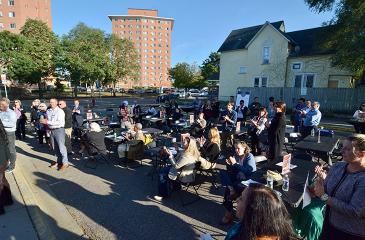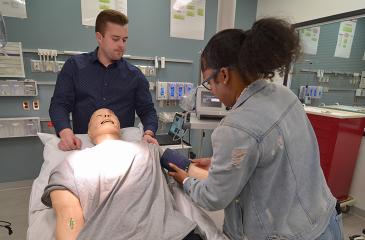Partnerships
OACA makes it easy for the state, industry and community to partner with the University, advancing health and wellbeing across the state.
Access to Clinical Trials
We work with health care providers across the state who need access to cutting-edge research, including clinical trials.
- Find a clinical trial by cancer type at the Masonic Cancer Center
- The Minnesota Cancer Clinical Trials Network aims to improve cancer outcomes for all Minnesotans through greater access to cancer clinical trials in prevention and treatment.
- StudyFinder helps you easily find opportunities to participate in health research at the University of Minnesota and beyond.
Clinical Training Partnerships
We work closely with our clinical training partners to ensure our trainees acquire clinical skills and interprofessional competencies through robust clinical learning and simulation experiences.
Our clinical training partnerships across Minnesota, many of them in rural or underserved communities, serve as training sites for our thousands of health science learners. Our partnerships provide hands-on learning opportunities for our students and trainees and put us at the forefront of world-class research and innovative treatments.
Clinical Practice Partnerships
We work with partners inside and outside the University to create and foster interdisciplinary collaborations that strengthen clinical practice, pursue new knowledge, and advance patient care. We strengthen workforce skills among University clinical practice entities and health system partners to promote excellent patient care and outcomes, as well as develop and provide outstanding health care across the state.
Community-University Research Partnerships
Community groups — such as nonprofits, health care providers, and community advocates — can tackle the health issues they care about by partnering with the U of M on research.
- Workforce Solutions: QI Improvement Projects
- Community Outreach & Engagement
- Data Projects Driving Solutions
- Care Team Communication Platform - GuidePointe Pharmacy
- Improve Clinical Quality, Process, and Interprofessional Practice Care Model - National Center of Interprofessional Practice & Education
- Improve Interprofessional Practice Care Model Improvements - Community-University Health Care Center
- Interprofessional Programs Network Model - Center for Health Interprofessional Programs
- Mobile Clinic Initiative - Neighborhood Health Source
- Model to Monitor the Lifecycle of a Tiered Huddle System - Veterans Administration
- Quantitative and Qualitative Patient Satisfaction Model - Community-University Health Care Center
- Advance Novel Interprofessional Initiatives - Center for Interprofessional Health
- Advancing Strategic Imperatives - National Center of Interprofessional Practice & Education
- Community, Caregiver Initiative - National Center of Interprofessional Practice & Education
- Develop Student-driven IPE Experiences - Office of Academic Clinical Affairs
- Interprofessional Community Health Initiatives in West Central Minnesota - The UMN Morris Challenge
- Interprofessional Initiatives and Experiences - The Center for Interprofessional Health
- Global Challenges Community Engagement - The UMN Morris Challenge
- Social Determinants of Health: Connecting Patients and Families to Community Resources - Mower County/Mayo Clinic
- Outreach and Education for Future Health Professionals - The UMN Morris Challenge
- Raise Awareness of Fentanyl Use in Black Communities - Hope Network
- Recovery Resources, Curriculum and Psychoeducation - Wayside Recovery Addiction Center
- Community Health Needs Assessment - Welia Health
- Data-informed Community Health Advocacy - EA Therapeutic Health
- Health Service Programs Data Story - EA Therapeutics Health
- Interprofessional Education and Teaming Resources - HealthPartners
- Pediatric Preventive Care Community Assessment - Hennepin Pediatric Mobile Health
- Physical Therapy Profession and Practice in Bolivia - Mano a Mano
- Rural Health Service Strategy - Wilderness Health
- Workforce Mental Health and Burnout - Allina Health



